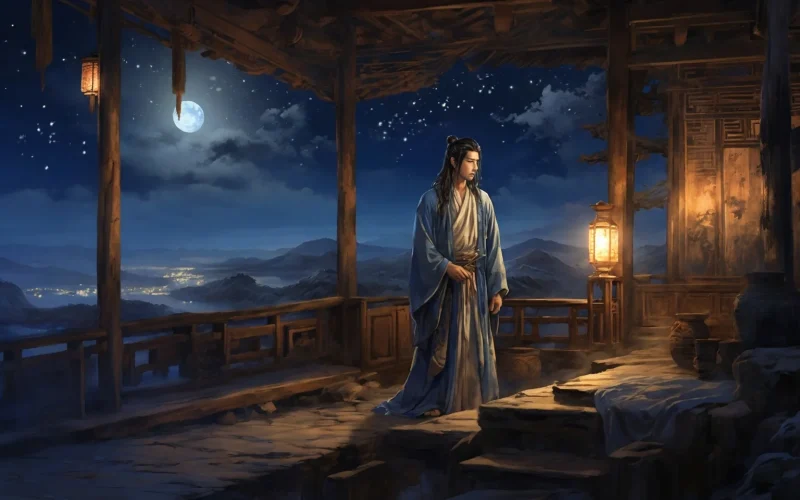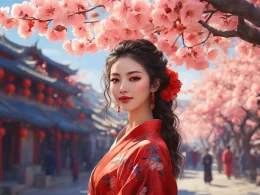In bygone years alone in empty room did I stay
To dream of the mountains of homeland far away.
Seeing no wild geese bringing me your letter now,
I only find the new moon like your arching brow.
Original Poem
「秋思赠远二首 · 其一」
王涯
当年只自守空帷,梦里关山觉别离。
不见乡书传雁足,唯看新月吐蛾眉。
Interpretation
Likely composed during Emperor Muzong's reign when Wang Ya served as military governor of Dongchuan, this poem conveys profound longing during prolonged separation from his wife. Through interwoven dreamscapes and reality, natural imagery and emotion, it reveals the poet's deep marital devotion.
First Couplet: "当年只自守空帷,梦里关山觉别离。"
Dāngnián zhǐ zì shǒu kōng wéi, mèng lǐ guānshān jué biélí.
Since our parting, empty curtains frame my view, Crossing mountain passes in dreams - until I wake to truth anew.
The opening juxtaposes domestic emptiness ("empty curtains") with illusory reunions ("mountain passes in dreams"). The sudden awakening to separation's reality heightens the emotional impact through stark contrast.
Second Couplet: "不见乡书传雁足,唯看新月吐蛾眉。"
Bú jiàn xiāng shū chuán yàn zú, wéi kàn xīn yuè tǔ é méi.
No letters come by messenger geese in flight, Just the crescent moon - your arched brow in moonlight.
The poet transforms disappointment (absent letters) into tender consolation through celestial imagery. The moon's slender curve becomes his wife's elegant eyebrow, blending astronomical observation with intimate memory in a poignant visual metaphor.
Holistic Appreciation
The poem is exquisitely crafted, weaving dreams with emotion and landscapes with meaning to convey profound sorrow of separation. The poet moves from past farewells to present longing, using dreams and the moon as vessels to blend reality and imagination, creating deep and far-reaching sentiment. Each image—meeting in dreams, no letters from wild geese, the crescent moon like arched eyebrows—bears the weight of yearning, shaping an elegantly melancholic atmosphere that is tender yet sorrowful, deeply moving to the reader.
Artistic Merits
Through alternating depictions of time and dreams, the poem intensifies the emotion of longing. Concrete images like "empty curtains" and "new moon" evoke an atmosphere that expresses abstract feelings. The parallel structure is precise, the language refined and subtle—nowhere does it explicitly speak of pain, yet every word carries emotion. Particularly striking is the line "the new moon reveals moth-eyebrow curves," which embeds longing within natural imagery, achieving profound meaning through deceptively simple phrasing. The artistic expression is remarkably powerful.
Insights
This poem captures one of humanity's most sincere emotions—the ache of prolonged separation and enduring love. It reminds us to cherish bonds of kinship and affection, nurturing connection and tenderness even in loneliness and distance. Though separated by vast miles, the poet sustains emotion through dreams and the moon—a spiritual anchor and devoted vigil that remains deeply touching even today.
Poem translator
Xu Yuanchong (许渊冲)
About the Poet
Wang Ya (王涯, 764 - 835), a native of Taiyuan in Shanxi Province, was a Mid-Tang statesman and poet. He attained the jinshi degree in 792 (the eighth year of the Zhenyuan era) and served six successive emperors from Dezong to Wenzong, rising to the position of chancellor and receiving the title Duke of Dai. Most of his poetic works were composed for court occasions, reflecting the typical ornate style of Mid-Tang official poetry. In his later years, he was implicated in the "Sweet Dew Incident" (Ganlu zhi bian), accused of rebellion by the powerful eunuch Qiu Shiliang, and executed by waist-cutting in the marketplace.
Consequently, much of his work was destroyed. The surviving poems primarily represent his early courtly compositions, exemplifying the characteristic taige (cabinet) style of the Mid-Tang period.












